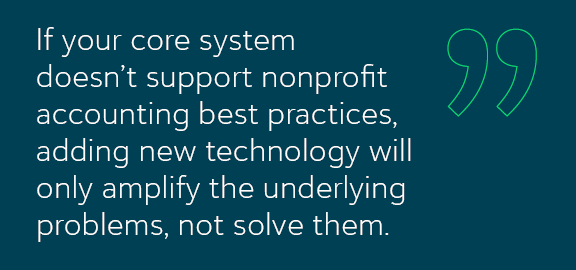Why Your Nonprofit Needs the Right Accounting System Before Embracing AI

Your nonprofit’s finance team is juggling restricted funds, grants, and project-specific donations, all while trying to prepare reports, stay compliant, and keep the organization’s mission on track. Now imagine layering automation and AI tools onto your existing system, expecting streamlined workflows and predictive insights—but instead finding more confusion, inaccuracies, and inefficiencies.
The problem isn’t the technology. It’s the foundation.
For nonprofits, successful automation and AI integration starts with a process to easily manage your restricted funding. Without this, the systems designed to save you time could end up costing you more in errors and inefficiencies. In this blog post, you’ll see why fund accounting software is the cornerstone for transforming your finance office into a modern, tech-enabled operation.
The Importance of Good Data Management for Automation and AI
Automation and AI thrive on accurate, well-organized data. For nonprofits, managing restricted funds—such as grants earmarked for specific programs—requires an added layer of detail and precision. Without a system built to handle this complexity, you risk feeding incomplete or incorrect data into your automation and AI-enhanced workflows.
Fund accounting software is purpose-built to track restricted funds and honor donor intent. It ensures that every dollar is categorized correctly and spent appropriately, providing a clean and reliable data foundation. With this level of granularity, your automation tools can deliver the insights and time savings you’re looking for.
For example, imagine using AI to forecast cash flow or optimize resource allocation. If your system isn’t designed to distinguish between unrestricted funds and those tied to specific programs, your predictions will be flawed from the start. The better your data, the better your results—and that begins with the right accounting system.
Challenges with Spreadsheets and Commercial Accounting Systems
Many nonprofits still rely on spreadsheets or commercial accounting software to manage their finances. While these tools can be sufficient for day-to-day tasks, they fall short when it comes to nonprofit-specific needs.
Spreadsheets are prone to human error, lack real-time collaboration, and can quickly become unmanageable as your organization grows. A single misstep—like overwriting a formula or misplacing a decimal—can have ripple effects, jeopardizing compliance or creating inaccurate reports.
Commercial accounting systems, on the other hand, often lack the functionality to track restricted funds and donor intent. They’re designed for businesses, not nonprofits, and force finance teams to use workarounds that introduce inefficiencies and gaps in oversight.
These limitations make it difficult to successfully implement automation and AI to support your nonprofit accounting goals. If your core system doesn’t support nonprofit accounting best practices, adding new technology will only amplify the underlying problems, not solve them.

How Fund Accounting Software Enables Automation and AI
Fund accounting software isn’t just another tool in your tech stack—it’s the foundation that enables everything else to work effectively. By providing a single source of truth for your organization’s financial data, it paves the way for automation and AI to deliver meaningful results.
For example, fund accounting software can:
- Streamline workflows: Functionality within your system can automate repetitive tasks like data entry, reconciliation, and reporting, saving hours of staff time. For example, your system can automatically provide updates based on program or grant-specific budgets, so you know how much you still have left to spend.
- Reduce errors: Built-in controls ensure that transactions are categorized correctly, making it easier to comply with donor restrictions and audit requirements. For instance, if a grant is earmarked for a specific program, the software can flag any attempt to allocate funds elsewhere, helping to maintain compliance and avoid costly mistakes during audits.
- Provide actionable insights: AI tools can analyze your financial data to identify trends, forecast future needs, and optimize resource allocation—all powered by the clean, organized data from your fund accounting system. Create program-specific reports on a regular basis and send them to program managers and your development team before they need to know the information.
Instead of manually reconciling transactions across multiple systems, your accounting software can integrate with your donor management platform to pull gift information directly into your fund accounting system. Donations are automatically categorized and posted to the correct accounts, while AI-powered dashboards highlight key metrics like grant spending and cash flow. The result? A more efficient finance team and better decision-making across your organization.
Building a Strong Foundation for Automation in Nonprofit Finance
Advancing your mission requires a solid foundation. Fund accounting software provides the structure and oversight your organization needs to manage restricted funds, honor donor intent, and ensure compliance—all while setting the stage for automation and AI to shine.
Don’t let outdated tools hold your organization back. By investing in purpose-built accounting systems, you can streamline workflows, reduce errors, and unlock the full potential of advanced technologies.
Ready to take the next step? Learn how to get started with automation in your nonprofit finance office by exploring our guide to automation in nonprofit accounting. It’s time to modernize your systems and create the impact your mission deserves.



